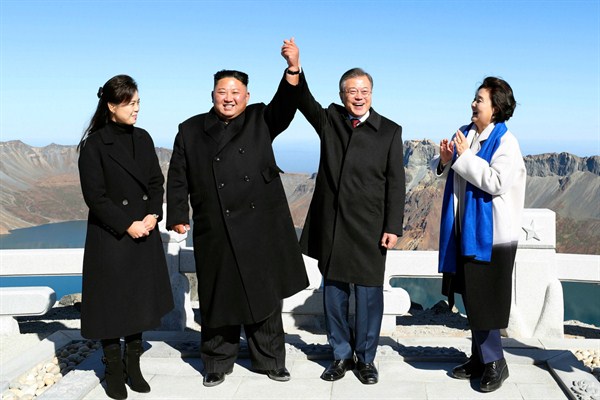The traditional harvest festival of Chuseok is one of the most important days in Korean culture. It is a time to celebrate and rekindle family ties, aided by good food and good drink—that is, if you can make it through the traffic. Chuseok falls on the 15th day of the eighth month of the lunar calendar, which this year was Sept. 24, days after South Korean President Moon Jae-in and North Korean Supreme Leader Kim Jong Un met in Pyongyang for their third summit.
In keeping with the spirit of the season, the two men and their spouses put on a show that had all the conventional trappings of a family reunion: warm hugs, shared meals and even some playful photo ops. Moon became the first South Korean leader to deliver remarks directly to a mass audience in the North, and the 150,000-strong crowd received him with raucous applause. As longtime Korea-watcher Andrei Lankov wrote, “The summit was, above all, a mood-building exercise.” On that measure alone, it yielded a bumper crop.
On matters of substance, though, the harvest is still far off. This is obviously true of negotiations over the North Korean nuclear program, but another area that has received less attention is the prospect of increased North-South economic engagement. In the joint declaration issued after last week’s summit, the two sides pledged to “pursue substantial measures” to develop the North’s economy, with the caveat that they be implemented “once necessary conditions are met.” Specifically, the declaration calls for ground-breaking on cross-border transit links and the rebooting of the Kaesong Industrial Complex—which was first set up in 2002 just north of the Demilitarized Zone as a way to provide cheap labor to South Korean companies and economic opportunities to North Korean workers—as well as other ventures in tourism, forestry and public health. While none of these ideas are new, they could prepare the ground for deeper cross-border engagement in the future. Yet analysts note that there are good reasons to be skeptical about anything significant happening soon.

